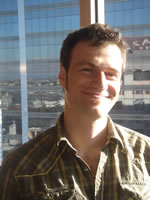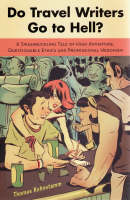 Travelling the road to hell
Travelling the road to hell
Thomas Kohnstamm is a well-travelled man, used to adventure and escaping tight spots while working in what many people would consider a dream job, travel writing. His Do Travel Writers go to Hell? created a storm of attention after he revealed the practice of ‘desk updates’ for travel destinations and the freelancer’s dilemma of costs of travel and research versus payment for the job.
As a person who has worked in the media the concept of a desk update isn’t that shocking to me – many stories are recycled and updated and re-topped to allow a quick article with a couple of phone calls. And most serious writers will have a tale of woe about freelancing or trying to get a magazine or paper to buy a story.
Unexpected media attention can be difficult to go through, yet Kohnstamm wasn’t sore about that when I met him. He was sore because he was in a serious car smash and could hardly move. His car was hit by a “large commercial truck.”
“It more or less made the car look like a stubbed out cigarette,” he says.
“It’s a little easier to laugh about now – it was kind of traumatising at the time.”
On his first trip to New Zealand, Kohnstamm is promoting his book and running a travel writing workshop at the Auckland Writers and Readers festival. Any kind of expose book is a brave decision. Kohnstamm says it wasn’t easy to “pull the trigger”.
Honesty and controversy
“I’ve been thinking about that quite a bit lately. When I was writing it I more or less tried to write in a vacuum. I didn’t show it to anyone except for my editor, my agent in the early stages. I was worried about being able to, you might say, pull the trigger on certain things – particularly if I started to think about ‘what’s my mum going to think about this…'
“I just tried to be as honest as possible. I did my best to look at the good, the bad and the ugly of my situation in New York, myself, myself as a travel writer – to look at both sidese and try to be honest about what I experienced and try to do it in a hunourous way.”
The book will make you laugh – it is part jaw-dropper and part page-turner.
“I knew that there would be some things in there that were quite controversial. I didn’t realise quite to the degree that things went a little bit before the book was actually published. There was obviously a lot of heated controversy for a little bit, but I honestly believe that that wasn’t about the content of the book – it was about speculation about the content of the book.”
Kohnstamm goes switch on the idea of the American dream in the book – he disconnects himself from work and relationships and possessions in New York to take on a Lonely Planet travel writer’s contract. No simple re-write, but a major overhaul was required, which meant potentially visiting and researching thousands of restaurants, supermarkets, museums, bars and hotels. He was facing a mountainous task.
“I didn’t really have any choice to turn back at the point. I had dived in head first.
“One of the things I was speaking to in the book is that a lot of the turnover in the travel writing industry is based on the young, wide-eyed, idealistic travel writers who are more or less working for a byline and trying to figure it out along the way. My first experience was different from my last, but a lot of people don’t last more than a couple of projects.”
“There’s a lot of turnover and a lot of people going from idealistic to burnout within one to two projects.”
It is easy to fall into the trap of travelling and end up with fellow countrymen or other travellers like you and not experiencing new and interesting things, he says.
“It’s increasingly difficult as there are more and more travellers. There’s always the temptation to hang out with like-minded people… and it depends on the country that you’re in. Some places you’ll always be an outsider no matter what you do. It depends what you want out of travel. If you want to go to a country and have a good time … as long as you're respectful to the place where you’re at, more power to you. It’s your time off right?”
“There’s definitely something to be said for branching out a little on your own and getting to know more about a place and its culture and getting away from the backpacker trail. That said, the backpacker trail can have, particularly in developing countries, a strange, if not frequently negative effect on the development of the local economy. Certain hotels in little towns and restaurants getting 90% of the business…”
“Many things are complicit in that, it’s not just the guidebooks. It’s the way people use the guidebooks and people not necessarily being as adventurous as they could be.
Writing and resilience
Adventurous travel required a certain degree of resilience, and reading the book reveals a man who has been knocked over by disease, women he met, men he met, things he did and took – but a person who somehow managed to stay positive.
“For better or worse I’m pretty much an optimist. I have my moments of despair, but the combination of optimism and pure adrenaline and being scared that you’re going to do a bad job. That goes into other kinds of writing too – I’ve heard novelists say that a fear of failing will keep you going through some tough times. A good dose of insecurity about what you’re working on turns out to be quite a bit of motivation.”
 The book follows a countdown to Kohnstamm’s deadline and the setbacks he suffers are not the average interruptions of writers. Kohnstamm doesn’t get interrupted by phonecalls or visits from aunties with cakes. Drinking sessions, wildly off-topic side trips, and a variety of beguiling situations and characters get in his way.
The book follows a countdown to Kohnstamm’s deadline and the setbacks he suffers are not the average interruptions of writers. Kohnstamm doesn’t get interrupted by phonecalls or visits from aunties with cakes. Drinking sessions, wildly off-topic side trips, and a variety of beguiling situations and characters get in his way.
“It’s a tricky thing to get into that state of mind when you’re producing quality writing. It’s working yourself into a trance of sorts.”
“In this book when I was in north-east Brazil, most of the people that are travelling there are going there for beach vacation party towns. It’s difficult to walk that line between being an effective researcher and data collector and being in this environment which is created around hedonistic practices.
“And at the same time, in guidebook writing there are different skills – there’s getting the phone numbers and the opening hours and there’s also immersing yourself in what’s going on so you’re able to write with some sort of authority about the place and what’s going on and why people might want to go there.
“If a place is a famous party town, you need to be doing some partying. It’s a fine line and I definitely fell on both sides of that line at points.”
Kohnstamm regularly works at libraries, but finds his local library gets crowded.
“The library can get too busy at times – particularly when it rains. You get some interesting characters.”
While most of his writing is from his own experience, he says The Seattle Public Library system is “fantastic.”
"I’m working on another book and I’d like to stick with book length format. The next book I’m working on is non-fiction, but I have some ideas for fiction – I would like to publish a novel at some point … that would be fantastic.”
Bukowski before Hunter S. Thompson
Kohnstamm is a fan of Hunter S. Thompson, whose work Kohnstamm’s has been compared to. He particularly likes The rum diary, but says the broad parallels are a “dangerous comparison”. If he had to pick one writer he was influenced by he would choose Charles Bukowski, he says.
“I’ve always appreciated the way he wrote so clearly. All the vile little details of his life; sometimes I’m like ‘I can’t believe you just said that’. Because he was so hard on himself, you didn’t lose sympathy for him as a narrator; he was so self-effacing in the process."
Kohnstamm’s next project is about the “joys of illegitimate fatherhood”.
“Returning to civilian life after a number of years on the road in perpetual motion, and an experience in which I thought that I had a Patagonian love child. It was an interesting life lesson … I’ll leave it at that.”
Richard Liddicoat interviewed Thomas Kohnstamm during the Auckland Writers and Readers Festival 2008.

